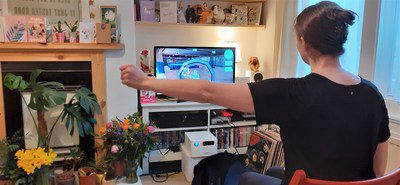Virtual rehabilitation kits provided by the company Evolv can treat patients at home during the COVID-19 pandemic.
Medical device company Evolv, with the support of Microsoft and hardware manufacturer ZOTAC, has donated its virtual rehabilitation technology to three leading hospitals.
Evolv’s product consists of a virtual therapy software platform called EvolvRehab and a hardware unit known as a RehabKit that connects to a television. The system allows patients to perform videogame-like activities called exergames that are prescribed by therapists who can remotely monitor patient adherence and performance through the system.
The Evolv RehabKit incorporate the Microsoft Azure Kinect DK which uses computer vision and Artificial Intelligence to track patients’ movements, and a mini-gaming PC from ZOTAC. Microsoft’s Azure cloud platform is used to securely host and share the experience, while Microsoft Teams allows patients and therapists to communicate quickly and easily. A simple, one-button start system ensures that patients with a physical or cognitive disability, or their caregivers, can easily use the RehabKit.
The RehabKits were donated to the National Hospital for Neurology and Neurosurgery (NHNN) in London, Mount Sinai Hospital in New York, and Fondazione Don Gnocchi in Milan – three cities hit hard by the pandemic.
Patients receiving rehabilitation at hospitals, clinics or centers in the community have been particularly affected by the COVID-19 outbreak due to many of these services being reduced or even canceled. For many medical conditions, not being able to access appropriate rehabilitation can have devastating consequences for individuals’ long-term functional outcomes.
David Fried, Chief Executive of Evolv, said: “The pandemic has had a devastating effect across the world on patients receiving specialized rehabilitation as well as on their families and caregivers. We wanted to help the medical professionals who are working tirelessly to continue treating their patients remotely under incredibly difficult circumstances. We are delighted that therapists can use our solution to provide telerehabilitation during this global crisis to support some vulnerable people in society directly in their own homes or out in the community.”
The NHNN is using the Kits in its Queen Square Upper Limb Neurorehabilitation Programme. Professor Nick Ward, a consultant neurologist who heads up the program, said virtual rehabilitation was benefiting patients: “We know that rehabilitation is vitally important for upper limb recovery. Repetitive training is one component, but it is often not motivating. We should be striving to create enriched environments for our patients to recover in, and the RehabKits are a great way of contributing to that in their own home.”
The feedback from Queen Square patients using the Evolv telerehabilitation solution has been very positive, with patients highlighting the motivational factor of using games as part of their therapy. One patient described their experience using the RehabKits as being “fantastic” while another stated “It was hard, but I found it challenging which I enjoyed. I was physically tired I have to admit, but it felt like after a good workout.” Another patient described repeating practical tasks like cutting food as being “really boring” while describing using the EvolvRehab exergames as part of their therapy as more engaging and stated emphatically “I seriously love it.”
Family members also saw the benefits of telerehabilitation, such as increasing personal autonomy, as one person noted “As a partner, it is great to see that the patient is doing something beneficial for themselves and doing it alone.”
Quentin Miller, Principal Program Manager for the Azure Kinect project at Microsoft talked about the tech giant’s role in the project, “We have an existing relationship with Evolv so when they asked us if we wished to participate in this project, we didn’t think twice about it. Microsoft has been at the forefront of providing transformative solutions in the healthcare field providing remote services to patients during the period of the COVID-19 pandemic.” Regarding this particular project Miller went on to say, “We hope to help hospitals use our technology along with that of Evolv and ZOTAC to help open the door to telerehabilitation and drive innovation inpatient care.”
Tony Wong, Chief Executive of ZOTAC, added: “As a technology leader in gaming and computer hardware, we were pleased to utilize our unique line of mini PCs in a collaborative solution to drive this amazing telerehabilitation initiative to help those in need.
Wong continued by saying “This opportunity to utilize our mini pc and graphics card engineering expertise to work in tandem with Evolv and Microsoft was a natural fit as many of our mini pc solutions power many other technologies behind the scenes and this was another example of that. We couldn’t be happier to be a part of this solution as it helps to improve the lives of those directly and indirectly affected by the COVID-19 pandemic and we hope this collaborative technology solution will continue to aid healthcare organizations and their patients in many other ways long into the future.”
The Evolv RehabKits will be rolled out to a network of facilities for older adults in New York as part of a fall prevention program supervised by the Abilities Research Center at Mount Sinai Hospital. Fondazione Don Gnocchi, one of the largest not-for-profit organizations in the field of rehabilitation in Italy, plans to use their donated RehabKits to provide home care to patients with neurological conditions including stroke and Multiple Sclerosis. Don Gnocchi has already used EvolvRehab to provide telerehabilitation services to its patients.
